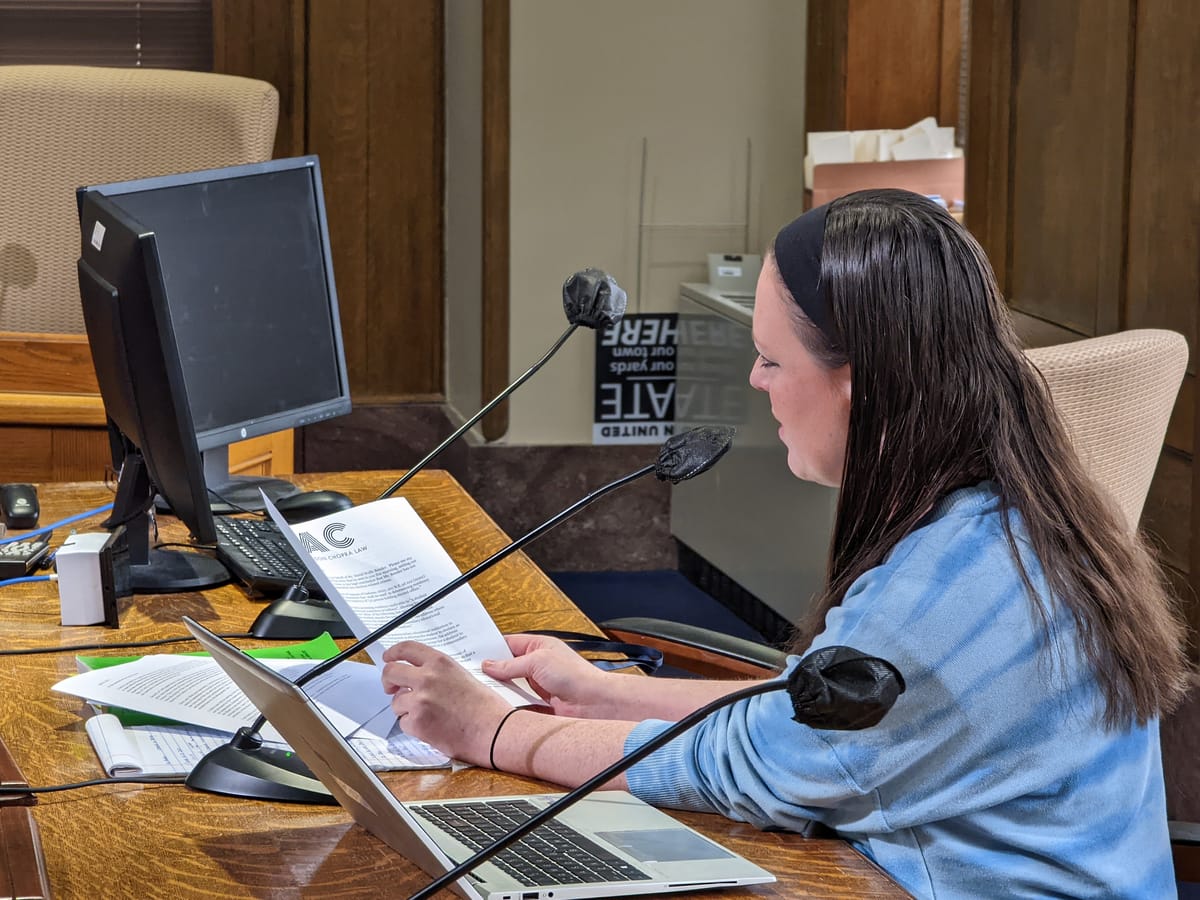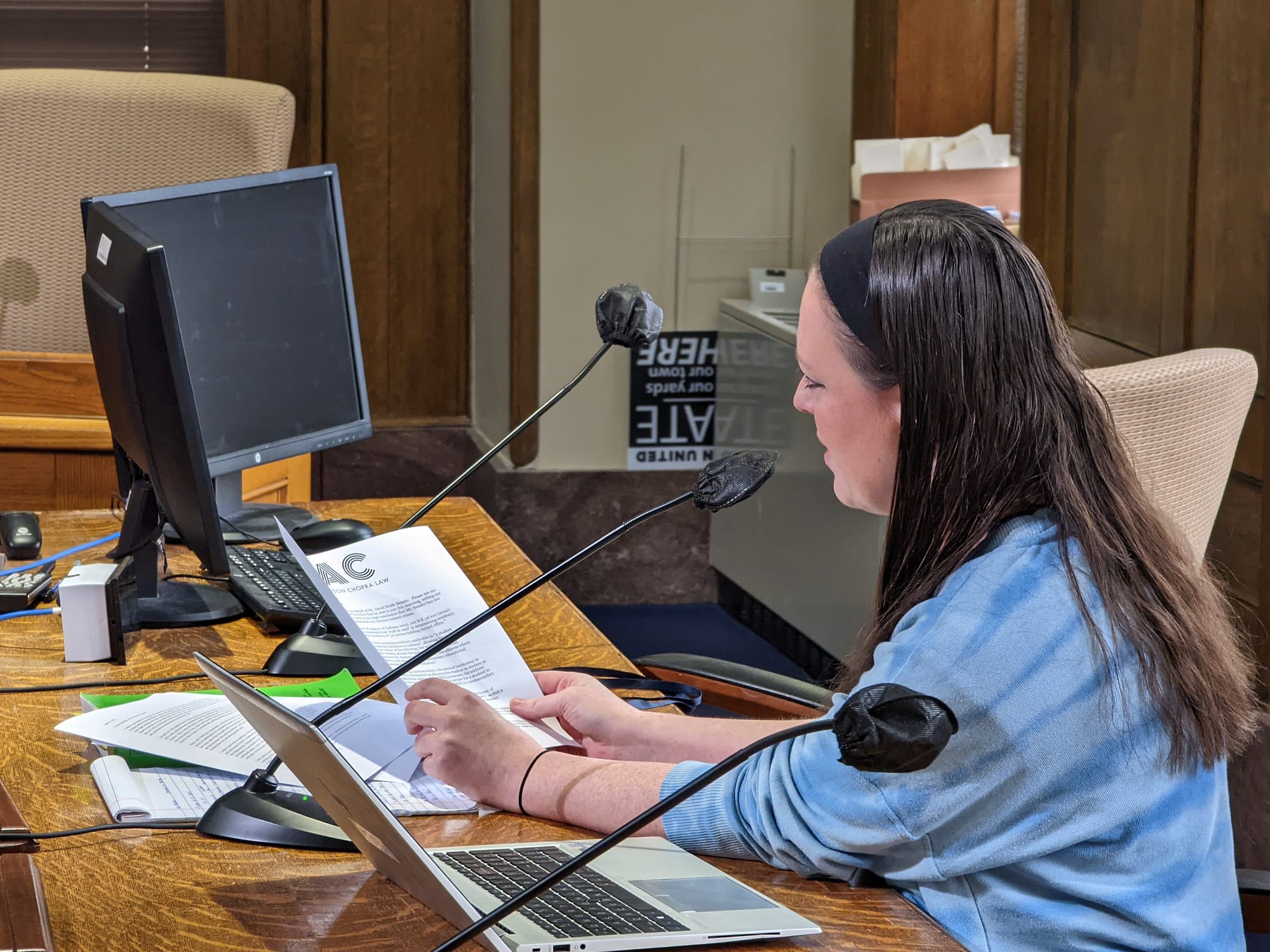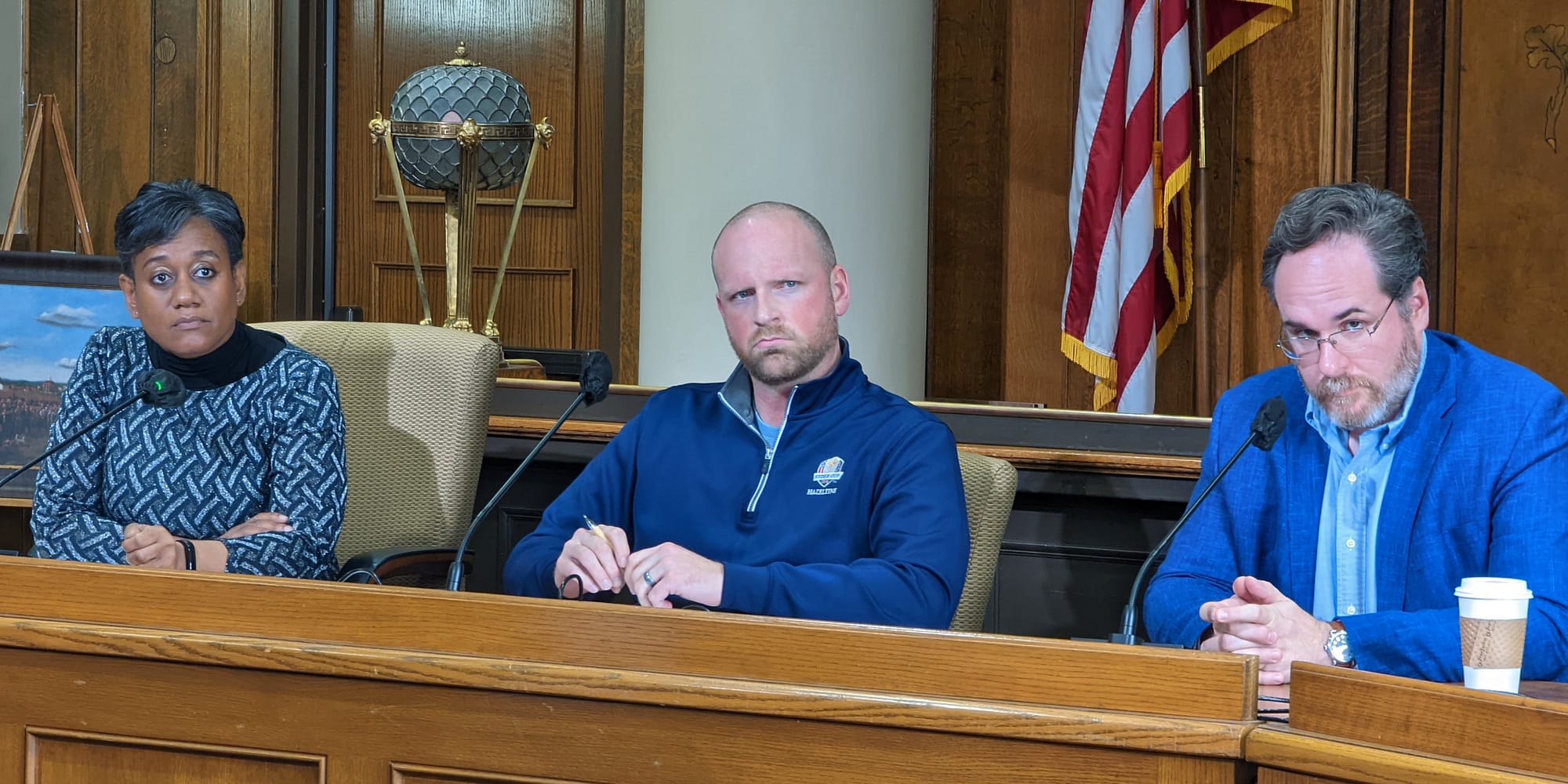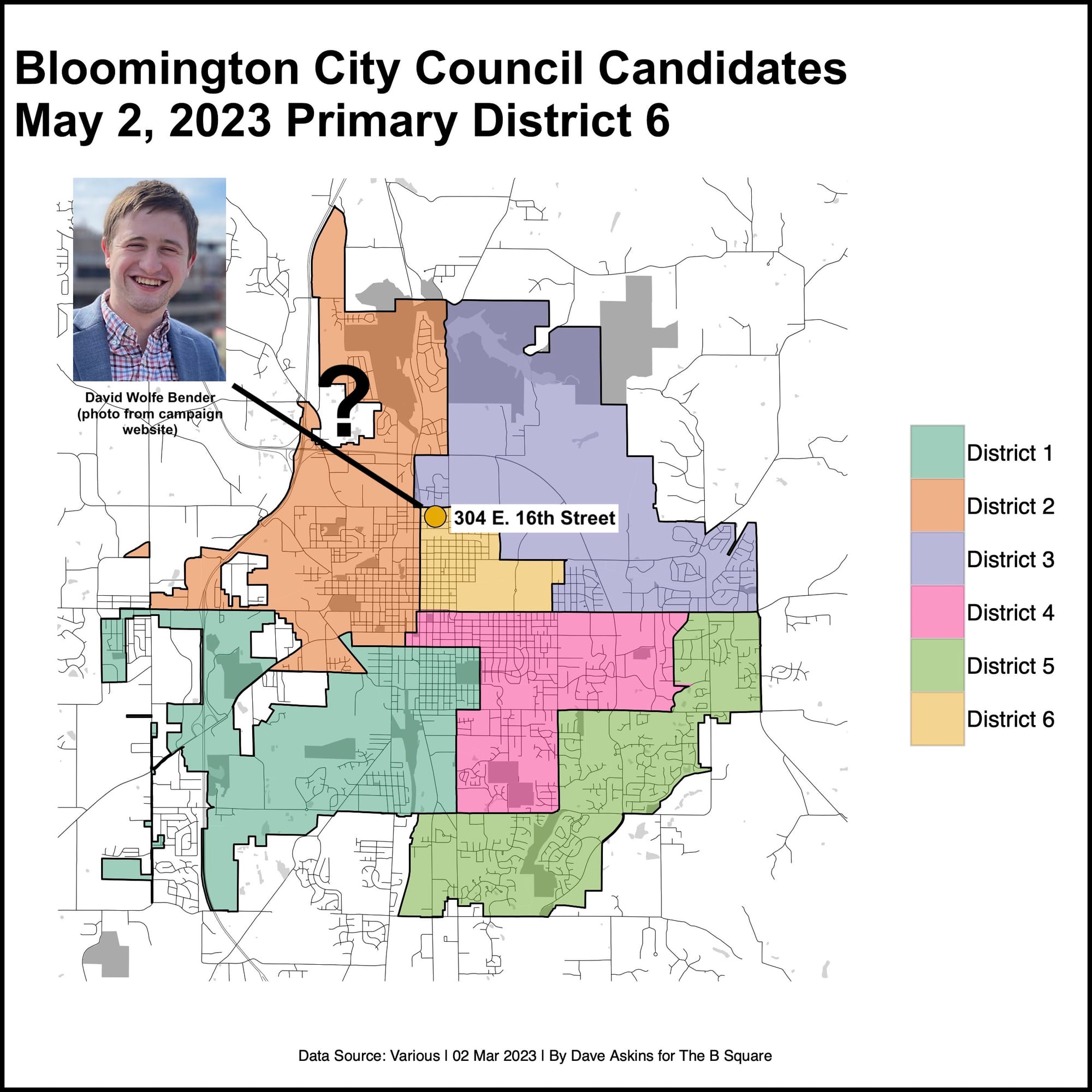New twist in District 6 Bloomington city council residency question: Bender fires attorney, says he wants to tell his story




In a letter received by Monroe County’s legal department on Thursday (April 6), David Wolfe Bender says he does not plan to resign as the Democratic Party’s nominee for Bloomington’s District 6 city council seat after the May 2 primary.
That’s a course reversal for the Indiana University student, whose eligibility as a candidate was subject of a complaint made by William Ellis, who is vice chair of the Monroe County Republican Party.
Ellis’s complaint was based on an Indiana Daily Student (IDS) article published on Feb. 17, 2023: City Council candidate David Wolfe Bender is running in District 6, residents say he doesn’t live there.
Bender had previously said—through his Taft-Jaffe attorney—that he intends to withdraw as the Democratic Party’s nominee after the May 2 primary. His name appears on the ballot as the sole candidate for the District 6 nomination, because no challenge to his eligibility was made in a timely way.
No Republican declared a primary candidacy for District 6 city council.
But Bender’s April 6 letter says, “I write this letter to clearly communicate that I no longer intend to withdraw my candidacy from this election.” Bender’s letter continues, “If the voters see fit to elect me as the next Councilmember for Bloomington’s Sixth District, then I believe I am fully able, willing, and indeed eager to serve.”
Highlights of the letter include the fact that Bender is willing to appear at the May 18 hearing that the election board has set to investigate the question of his residency.
The most recent action by the board is to clarify that the issues they’re examining involve the possible commission of felonies by Bender.
Another highlight from the letter is that Bender says he has fired his previous legal counsel—an attorney with the Taft-Jaffe law firm.
Bender’s new lawyer is Bloomington attorney Allison Chopra, who served from 2016 through 2019 on Bloomington’s city council as a Democrat and ran unsuccessfully for the Democratic Party’s nomination as circuit court judge in the 2022 primary.
Chopra’s letter to the election board, which was also sent on April 6, states: “In combination, the facts surrounding Mr. Bender’s voter registration and candidacy filings satisfy the legal requirements of Ind. Code Chap. 3-5-5 and any contentions to the contrary appear to be based on a misunderstanding of either the facts or the applicable law.”
The applicable law, according to Chopra’s letter, is IC 3-5-5-7 which establishes special rules governing residency applicable to “a student attending a postsecondary educational institution in Indiana.”
Bender’s letter describes the events leading to the controversy over his residency, which include signing a sublease at the address, with someone who apparently did not have the legal right to sublease the premises.
Bender’s letter states: “After further investigation, it became clear that the person with whom I signed the sublease was not actually listed on the primary lease at the property, despite the fact that he almost surely lives there.” Bender’s letter adds, “Clearly, however, this makes it impossible for him to sublease the property.”
At Thursday’s election board meeting, board members indicated they had not yet received the letter from Bender or his legal counsel. The apparent approach they’ll take is to formally acknowledge receipt of that correspondence at their next convening of the board.
But based on Thursday’s meeting, it does not look like board members are eager to try schedule a meeting before the already-set May 18 hearing, in order to hear from Bender.
Bender’s letter states that he dismissed his previous legal counsel in part because of “the inappropriate, disingenuous, and disrespectful manner in which he corresponded with the members of this Board.”
Bender’s letter rejects the idea, which was conveyed in correspondence from his previous attorney, that the election board’s investigation into his residency was motivated by partisan politics.
Bender’s letter says, “[M]y former attorney suggested this investigation was a politically motivated attack. I don’t believe that to be the case. As a Monroe County resident, I appreciate the dedication of this Board and its members, and I understand the significance of the issue.”
Bender’s letter also offers an apology:
I also want to apologize to the residents of Monroe County, the City of Bloomington, and in particular, the residents of Bloomington’s Sixth District. They didn’t deserve this chaos. And though I will maintain that I didn’t mean for any of this chaos to happen, and I believe that the record will demonstrate that I have fully complied with the law at every step, I still wish to apologize for my evasiveness over the past month and express regret that I did not take greater care in regard to this process. For that, I’m truly sorry.
For the May 18 hearing, it will not be former local attorney Guy Loftman, who will serve as a proxy for election board member David Henry—that’s according to remarks made by Henry at Thursday’s election board meeting.
Loftman has withdrawn from that role—after serving up to now as Henry’s proxy for the meetings involving the election board’s investigation into Bender’s residency.
Bender’s April 6 letter indicates some prior communication between Bender and Henry over the residency controversy: “At the advice of a member of this Board who has since recused himself from these discussions (David Henry), I retained a lawyer, who I’ve since fired.”
At Thursday’s election board meeting, Republican Party appointee Donovan Garletts said the reason for Loftman’s withdrawal did not involve any tension or conflict with the other board members.
After Thursday’s election board meeting, Henry told the press that the county’s legal department had some concerns about Loftman serving on the election board as a proxy, while at the same time serving on the county’s board of zoning appeals. The legal question is whether that arrangement would conflict with the Indiana state constitutional prohibition against serving in two different “lucrative offices” at the same time.
As chair of the Monroe County Democratic Party, Henry appointed himself as his party’s representative, after Shruti Rana resigned, in order to run for District 5 city council. Henry’s appointment of himself is intended to be on an interim basis until he can find someone else to serve. But for now, he is the Democratic Party’s appointee to the election board.




Comments ()